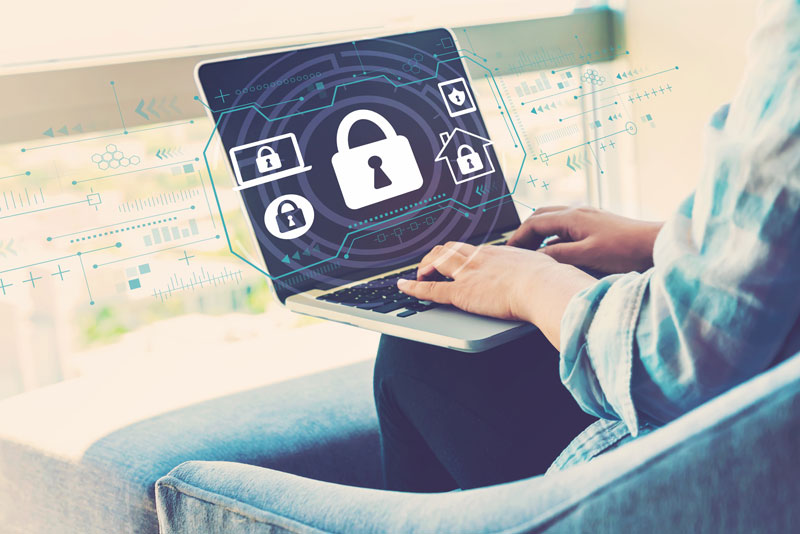 Cybersecurity is a constant battle, and you don’t want to be the one to lose. A dynamic business environment coupled with mobility and the rapid adoption of cloud services are combining to create more opportunities for employees to work at home. Unfortunately, these same factors make it easier for hackers to penetrate corporate networks.
Cybersecurity is a constant battle, and you don’t want to be the one to lose. A dynamic business environment coupled with mobility and the rapid adoption of cloud services are combining to create more opportunities for employees to work at home. Unfortunately, these same factors make it easier for hackers to penetrate corporate networks.
As more employees get remote access to company data, the stakes of a network breach go up–and so do the risks. When you work in the digital age, it’s important to be fully aware of the types of threats that could affect your productivity and reputation. Here are some cybersecurity tips to share with your coworkers and/or employees working from home.
1. Use strong passwords
A password is the first line of defense against hackers and identity theft. The longer and more complex your password, the harder it will be for hackers to gain access to your account. A good password should be a mix of upper and lowercase letters, numbers and symbols (like! or @). It should also have at least one capital letter and punctuation mark as a prefix or suffix. For example, “password” would be a weak password because it contains all lowercase letters, but “P@ssw0rd” would be a much stronger option because it contains both upper and lowercase letters, has a number and has an @ symbol.
2. Enable two-factor authentication
Two-factor authentication or 2FA means you need more than just a password to log into an account. In addition to entering your username and password, you will need an additional login code generated by an application on your phone or another device to open your account. This additional code can be generated with a six-digit number sent via text or voice call, or a onetime passcode (OTP) delivered by email or text message.
3. Protect your computer with a virtual private network (VPN)
Virtual private networks (VPNs) are encrypted connections between devices that allow information to flow through privately, which makes it more difficult for hackers to intercept the data while it’s being sent over the internet. The benefit here is that you don’t have to worry about anyone snooping on your internet usage when using a public Wi-Fi network in a coffee shop, airport or hotel lobby, since their computers are not connected directly to the internet, but instead just share information with other nearby devices through their VPN settings.
4. Keep your software up to date
Make sure you have the latest versions of all the software on your computer — especially those used for work. Hackers are constantly finding new ways to exploit vulnerabilities in popular programs and applications, so it’s important to update as soon as patches become available. If your company has remote management tools like Microsoft System Center Configuration Manager (SCCM), make sure they’re configured properly as well.
5. Learn how to spot phishing scams
Phishing scams are some of the most common forms of cybercrime. They’re designed to steal information from users and companies by impersonating legitimate businesses or government agencies. The best way to protect yourself from these scams is by learning how to spot them. To stop these scams from happening, try the following tips:
Don’t click on links sent in emails or chat messages unless you know who sent them and what they’re about;
Be wary of emails asking for your password or credit card details; and/or
If someone asks for money through an online payment system, it’s likely a scammer trying to get money from you under false pretenses.
6. Use encrypted file sharing
It’s easy to share files with coworkers and clients, but it’s important to make sure the data is encrypted before it leaves your computer. The best way is to use a secure file-sharing platform like Dropbox or Google Drive, which encrypts all of your files before they’re even uploaded. This makes it so that only you can access the files, and even if someone else has access to your computer, they won’t be able to see what’s inside them.
7. Separate work devices from personal devices
You should never share your keystrokes and passwords with anyone else, but that’s not really possible when you’re working from home in a shared office space. To keep yourself safe, you need to separate work devices from personal devices. This means that every device you use for work must also have a unique password that only allows you to access the company’s network from there.
8. Back up your data
Even if you don’t think about backups very often, it’s important to do so — especially when working from home without an office environment around you at all times. Make sure you regularly back up all of your important files and information onto external hard drives or cloud storage providers like Dropbox or Google Drive.
In conclusion
Cybersecurity is a growing concern for companies, and employees who work from home are particularly vulnerable to cyber attacks. Whether an employee works from home one day a week or every day of the year, it’s important to implement the right security measures.
The most effective method for preventing cybercrime is not to take unnecessary risks. Cyber attacks are almost always preventable if you follow basic security protocols. They might cost a little more in productivity and planning, but your organization will save on expensive breaches and lost data.
Need help? Contact AccSys Solutions. We are happy to assist any way we can!
